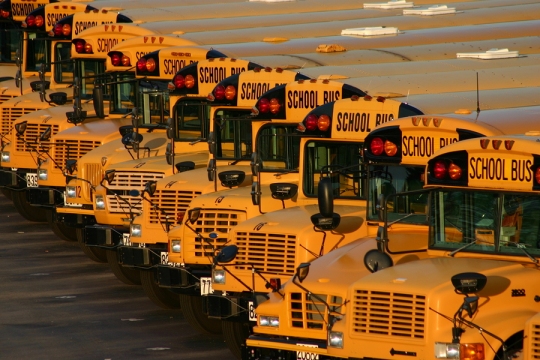 Stock photo of parked school buses.
Stock photo of parked school buses.HOLLYWOOD, Md.—The Calvert County Public Schools (CCPS) paid bus contractors nearly $250,000 more than necessary in fuel reimbursement in 2013 and 2014, said a July report released by the state's Office of Legislative Audits. State auditors also wrote that the schools would spend about $5 million more over the 12 years of about 120 buses' lifespan largely due to not basing its payment calculation on market rates.
The state-mandated audit is conducted every six years and is intended to evaluate if the schools have effectively used its financial resources. The report concluded that CCPS needs more improvement in some of its financial practices and provided a total of 12 recommendations.
The report came at a time when CCPS had difficulty balancing its budget after decreased state funding, increased health benefits costs and declining student enrollment. Last year, CCPS lost $4 million in funding and had to make significant staff reduction to balance its budget. As a result, about 70 positions were cut, according to the schools' 2016 budget.
Early this year, CCPS budgeted $3 million from its fund balance to give its employees a step increase. An agreement was later reached in late June to implement one step increase in 2016 and another one in 2017. But teachers' salaries are still several steps behind. The County Times previously reported that Calvert education officials said they were worried that some of their best and most experienced teachers were moving to neighboring St. Mary's County over dissatisfaction with their pay schedules.
"As we were looking at reducing our costs last school year, I can honestly say no one came forward and said, well, you know, if we change this calculation for how we reimburse our bus contractors, we would save some money," said Daniel Curry, Superintendent of CCPS.
In the past, the school paid contractors for fuel usage without taking out federal excise taxes, which the contractors are exempt from paying and may claim tax credit on their income tax returns. State auditors said school contactors are exempt from the $0.244 per gallon excise tax on diesel fuel and may receive tax credit on their income tax returns of $0.243 per gallon.
Curry said the calculation the schools used to use was an old practice that had existed for many years.
The state auditors did not identify this issue in their previous report in 2009, and CCPS is not the only school district in the state to reimburse contractors the full price on fuel. In a 2015 report, state auditors found Harford County Public Schools also reimbursed contractors for their federal fuel excise tax costs.
Curry agreed with the report's recommendation that the calculation needed to be updated to reflect the tax exemptions.
Starting the beginning of this school year, Curry said the school would not reimburse bus contractors for the full price they pay at the pump. The schools' new practice will deduct both federal and state tax exemptions. Curry said a new state legislation that gives bus contractors state tax exemptions "served to shine a light on our current practice" and prompted the schools to ask: "shouldn't we also include the feral tax and back that out when we do our calculation?"
In addition to paying more than necessary on fuel reimbursement, the auditors said the schools would spend about $5 million more over the 12 years of school buses' lifespan partially because the school didn't use the prime interest rate in its calculation of an annual payment.
For each bus, the schools pay a per vehicle allotment (PVA) every year. The payment is intended to reimburse bus contractors for their costs. The PVA formula includes reimbursement for the cost of the bus and a flat rate of return on the investment.
Compared with the auditors' calculation, the report said the school pays between $622 to $6,380 more on each bus annually. The reason, the auditors said, is largely due to CCPS's formula, which used an average borrowing rate for the return on investment rate instead of the prime interest rate. The auditors believed the 6 percent rate that the schools use is much higher than the prime rate, which is about 3.5 percent this week according to Wall Street Journal.
"The auditors don't tell anyone what the return on investment rate is, but they are more than happy to say you've overpaid," said Edward Cassidy, Director of Transportation at CCPS.
Cassidy disagreed with the auditors regarding which rate should be used to determine payment. Cassidy said the school established the return on investment rate through calling local banks. He said the prime rate that the auditors recommended is not realistic because it is not a rate that a small business could get from a bank.
In the report, the auditors recommend CCPS to use market investment rates as a basis for determining contractor rates for the annual PVA and develop supportable cost estimates to establish reasonable contracts rates for operation costs and per mile maintenance costs. They also suggest the school to exclude federal fuel excise taxes from contractor payments, a recommendation the schools said they have already implemented since July 1.
Curry emphasized that the auditor's findings are recommendations, "as opposed to being categorized as violations." He said the schools have taken the recommendations to heart and "will do our best to try to implement their recommendations over time."


